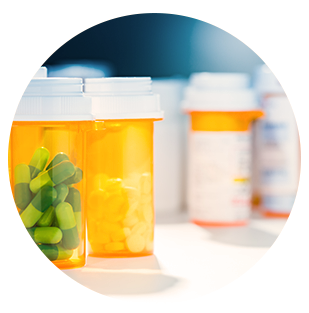At our Banyan drug rehab in Sebring, FL, we understand how difficult prescription drug withdrawal can be. Often, withdrawal symptoms are so severe that those struggling with prescription drug use disorders return to using within 24 hours. The key to overcoming this obstacle is a medically supervised detox where withdrawals can be identified and addressed. Following an initial clinical assessment and the development of a personalized treatment plan, patients can begin their recovery with our prescription medication detox.

Prescription Drug Dependence
There are various kinds of prescription drugs, and not all have the potential to be habit-forming. However, many prescription drugs – usually the most prescribed – can lead to dependence and addiction when misused or taken for extended periods. There are three main kinds of commonly abused prescription drugs: depressants, stimulants, and opioid narcotics.
Depressants
As you can imagine, depressants are drugs that depress or sedate the central nervous system. These include drug classes like benzodiazepines (Xanax, Ativan, and Valium) as well as barbiturates. Usually, those who abuse these substances take them orally. Benzos are often prescribed to treat ailments like anxiety disorders, seizures, or symptoms of alcohol withdrawal.
Long-term use of depressant medications can cause the brain to be in a long-term state of relaxation. Chemicals like GABA are usually heightened and forcefully activated during active addiction. When those with a dependence suddenly quit or cut back on their use, the body reacts with withdrawals as the consistently relaxed functions suddenly surge.
Stimulants
Stimulants include amphetamines and methylphenidate, which are mostly used as ADHD medications. Commonly abused stimulants include brand names like Adderall, Dexedrine, and Biphetamine. As you may have guessed, stimulants impact the central nervous system by increasing or stimulating nerve activity, particularly neurotransmitters like dopamine and norepinephrine.
When used for extended periods, stimulants can also cause physical dependence due to long-term use. The brain becomes accustomed to being constantly stimulated, so it is common for addicts to experience withdrawals like depression, fatigue, and low energy. While stimulant withdrawal is not usually life-threatening, it is best to undergo medically supervised detox to prevent discomfort severe enough to cause relapse.
Opioid Narcotics
Opioids are among the most dangerous prescription drugs on the market. These include commonly abused substances like fentanyl, codeine, methadone, morphine, OxyContin (oxycodone), hydrocodone, and the street drug heroin. Opioids are normally prescribed to treat individuals with moderate to severe or chronic pain.
All opioids work by attaching to mu-Opioid receptors in the central nervous system and other areas of the body, blocking pain signals and alleviating symptoms. At the same time, opioids are also known for activating the reward system of the brain, elevating levels of the feel-good chemical dopamine. This euphoric and relaxing sensation is what hooks users and contributes to addiction.
Long-term opioid abuse of any kind can also lead to physical dependence, which is marked by withdrawal symptoms like vomiting, diarrhea, muscle pain, and more. Detox from prescription drugs like opioids is known for being highly dangerous, with severe dehydration being the most life-threatening symptom. For this reason, undergoing a professional opioid detox is crucial not only for avoiding relapse but also for preventing a fatal outcome.
How to Detox Your Body From Prescription Drugs
A medically monitored detox is the process of ridding the body of toxic substances, such as prescription drugs. At our Sebring, FL, rehab, all detox programs are led by a medical team of doctors and nurses trained and experienced in treating withdrawal symptoms. Without medical support, withdrawals can quickly become complicated, increasing the person’s risk of health problems like severe dehydration and relapse.
For individuals with severe prescription medication addictions, our Florida prescription drug detox is usually the first step in their treatment. Following a clinical assessment, the client will then begin the detoxification process, during which they will receive 24-hour care and support from our medical staff. Included in treatment is medication assistance, which is administered as needed to alleviate withdrawals.
Not only does detox ensure the individual’s health and safety as they go through a physically and mentally trying process, but it also decreases their chances of relapsing before they can get started on their recovery.
Prescription Medication Detox Near Me
Our prescription medication detox is only the first step at Banyan Sebring. Following detox, patients will then move on to the therapeutic portion of their treatment. During this phase, clients will focus on their mental recovery from addiction and work with our counselors and therapists to better understand the causes of their substance use disorders. It is just as important to focus on the mental and behavioral aspects of a person’s addiction as the physical aspect to ensure they are making a 360-degree change.
Our Sebring, FL, drug rehab is just one of several nationwide prescription drug detox centers in the Banyan family. To learn more about our levels of addiction treatment or other services, contact Banyan Treatment Centers today.
Related Reading:





